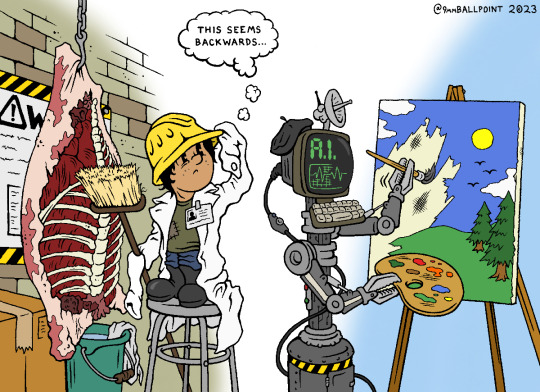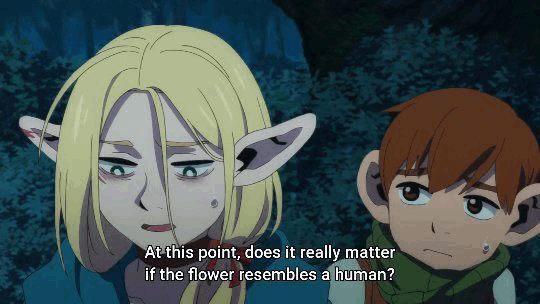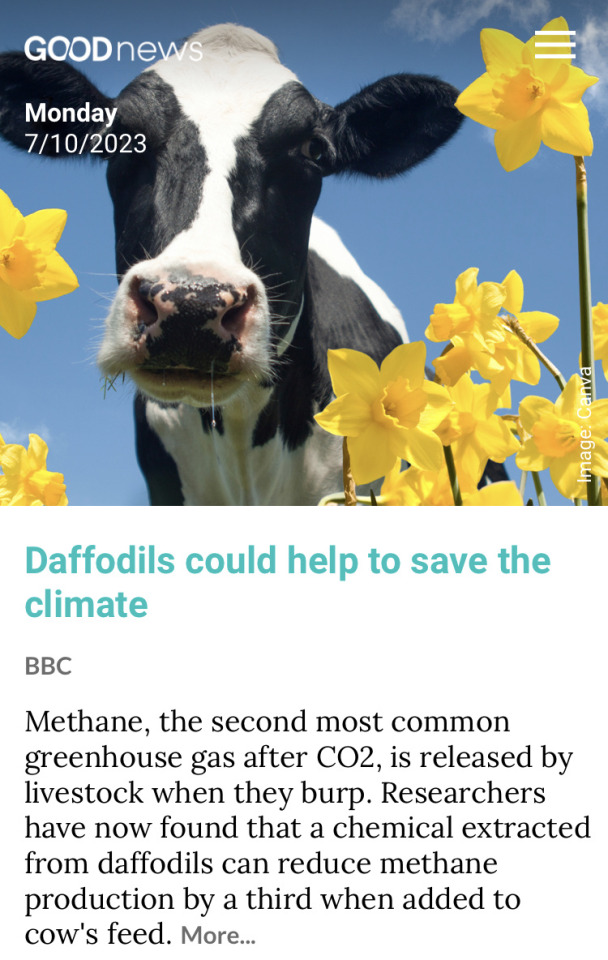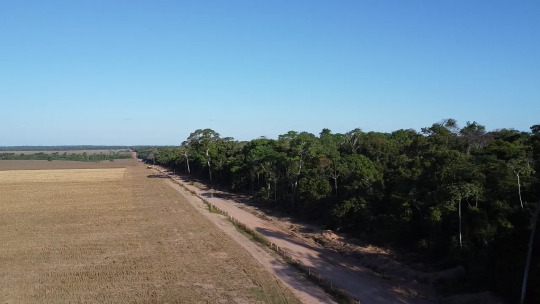#meat industry
Photo

I'm not anti-technology, I just think there's something deeply sick about a society where robots make art and children work in factories.
54K notes
·
View notes
Text
What I find really interesting about Dungeon Meshi is how it explores the role of humans/humanoids in an ecosystem and what is okay to consume.

Take the kelpie for example. Senshi is attached to the kelpie that frequently joins him while he's fishing, even naming her. Marcille also thinks it's cute and supports the idea of Senshi riding it. After that doesn't turn out well Senshi apologises while delivering the killing blow, appearing remorseful. Nevertheless, he himself sets out to salvage usable ingredients from the now deceased kelpie and even Marcille uses some of its fat for soap.
That is an example of exactly the type of relationship I think humans should have with livestock animals. I'm mostly vegan (occasional exceptions made for fish and eggs) both because of the environmental and animal rights issues with large scale livestock farming/the meat industry. However, I very much support a harmonious approach shown by indigenous peoples and small scale farming for example. Where, similar to Senshi and the kelpie, the animal lives a good life and is loved by its keepers until it is killed and all its parts are utilised.
There is also something to be said about people's involvement in the slaughter of animals so they respect the origin of their favourite products, like Marcille with the soap, since that is likely one of the reasons people currently consume animal products in such copious amounts. I regrettably didn't save the post in my drafts, but I saw someone on here talk about how far removed we are in the west from the origin of our meat products and how absurd it is that people are disgusted by a fish served with its head for example.
Meanwhile, Laios and Chilchuck are arguing over whether it's okay to eat a fish-man since it resembles a humanoid. Laios naturally wants to eat everything but Chilchuck has reservations when it comes to humanoids. This comes up in later episodes as well, where the rest of the crew appears to have fewer reservations since the creatures are being killed in self-defense and they're now seeing the utility of not letting resources go to waste.

Now I wonder if they'll take it as far as cannibalism, but humanoids are already a close metaphor. In any case, it is a great way to showcase how the arbitrary values we attribute to different species influences what we consider to be acceptable food, even though it's all just meat. I mean, I could never slaughter a cat for example but somehow would be fine with eating human flesh...
#honerable mention for Senshi's comments to never exhaust a food source#episode 7#dungeon meshi#delicious in dungeon#Senshi#Marcille#Laios#Chilchuck#utility#veganism#vegetarianism#livestock#meat industry#cannibalism#long post#ecosystem#queue#kelsonius op
193 notes
·
View notes
Text
Tumblr, I promise you that animal agriculture does not need you licking their boots.
#vegan#animal rights#animal agriculture#meat#dairy#eggs#meat industry#dairy industry#egg industry#veganism#go vegan#vegetarian#social justice#human rights#climate change#environmentalism#capitalism#classism#bootlicking#leftism#progressive#progressivism#me#personal#thatveganwhiterose#rant#vent
74 notes
·
View notes
Text
‘Oppressive’ child labor found at poultry plant’s kill floor after teen’s death, feds say
Read more at: https://www.miamiherald.com/news/nation-world/national/article288585497.html
A U.S. chicken producer is again facing child labor accusations after a 16-year-old worker was killed at its poultry plant in Mississippi last July, according to the U.S. Department of Labor.
On May 1, four teenagers, including two 16-year-olds and two 17-year-olds, were found working on the kill floor at Mar-Jac Poultry’s processing facility in Jasper, Alabama, federal court filings show.
With three teens’ shifts starting at 11 p.m. — and a fourth teen’s shift starting at 8:30 p.m. — they were each tasked with “hanging live chickens on hooks for slaughter and cutting meat from the carcasses,” according to court documents filed in U.S. District Court for the Northern District of Alabama.
This violates federal child labor provisions in place to protect minors from dangerous jobs that have proven deadly.
On July 14, 2023, Duvan Robert Tomas Perez, a 16-year-old migrant from Guatemala, was killed while cleaning a chicken deboning machine at Mar-Jac’s plant in Hattiesburg, Mississippi, according to a wrongful death lawsuit, McClatchy News previously reported.
The Labor Department’s Occupational Safety and Health Administration found Perez was fatally pulled into the “still-energized” machine because Mar-Jac Poultry MS LLC “disregarded safety standards.”
OSHA cited the company over his death in January, according to a news release.
Now, the Labor Department is seeking a court order to stop Mar-Jac from selling and shipping “poultry tainted by oppressive child labor” from the company’s plant in Alabama, court filings say.
An “urgent” request for a temporary restraining order and preliminary injunction filed by Acting Labor Secretary Julie Su asks the court to prevent Mar-Jac Poultry of Alabama, LLC, from profiting off products linked to child labor.
Following the request, an evidentiary hearing was held on May 14 and May 15, Mar-Jac said in a May 20 news release provided to McClatchy News in response to a request for comment.
Instead of granting the request, the court ordered Su to submit a brief by May 28 and ordered Mar-Jac to submit a response to the brief by June 4, the release said.
What Mar-Jac says about the child labor accusations
In a response filed May 8, Mar-Jac contends it offered to stop shipping poultry produced on the May 1 shift, when the alleged child labor violations involving the four teens were uncovered by the Labor Department’s Wage and Hour Division.
However, the Wage and Hour Division “rejected that offer and demanded Mar-Jac not ship goods in interstate commerce for the next 30 days,” the filing says.
This would “would put more than 1000 workers out of their jobs for that 1-month period and disrupt the supply chain, adversely affecting hundreds more workers involved in growing and transporting poultry products,” Mar-Jac said in its news release.
Mar-Jac refused the division’s demand and argues that the company was unaware three of the four minor employees were underage.
According to the Labor Department, Wage and Hour Division investigators learned the four teens “had been working at the facility for months,” a complaint says.
The department has declared all chicken produced by Mar-Jac up until May 31 are “hot goods” that are “tainted by child labor,” according to the complaint.
Mar-Jac maintains three of the four teens showed documents that claimed they were older than 17 and were then verified as over 18, according to the May 8 court filing.
The company says it “immediately discharged” the three minors after learning they were underage and denied that they worked on the Alabama plant’s kill floor, the filing says.
As for the fourth minor, Mar-Jac said federal investigators haven’t identified the teen, “making it impossible for Mar-Jac to end the alleged (child labor) violation,” according to the filing.
On May 14, the Labor Department called Mar-Jac’s response a “misguided attempt to persuade this Court to allow (the company) to flout the inherent dangers of oppressive child labor,” court records show.
Mar-Jac said in the release that the company “will continue to vigorously defend itself and expects to prevail in this matter” and that it is “committed to complying with all relevant laws, including but not limited to the child labor regulations.”
Following the death of Perez at the Mississippi poultry plant, Mar-Jac acknowledged he “should not have been hired” because he was under 18, according to a July 19 news release published online by WDAM-TV.
The company said the employee’s age and identity “were misrepresented” on his hiring paperwork, according to the release.
Seth Hunter, an attorney representing Perez’s mother, who is suing over his death, said in a news release provided to McClatchy News in February that Mar-Jac’s “working conditions have to change.”
He said Chick-fil-A “is one of Mar-Jac’s largest customers” and that Chick-fil-A and other companies “should insist on better working conditions or stop doing business with them.”
At the time, Chick-fil-A didn’t respond to McClatchy News’ request for comment from Feb. 5.
A few months after Perez’s death, the company told NBC News in October that “We are reviewing our own procedures for investigation and response as we pursue the steps necessary to effectively hold all our suppliers to our high safety standards.”
Similar to Perez, a New York Times investigative report published in September found many migrant children and teens are working dangerous jobs, including at poultry plants.
Mar-Jac’s plant in Jasper, Alabama, is about a 240-mile drive west of the company’s headquarters in Gainesville, Georgia.
81 notes
·
View notes
Text
It's so weird how meat-forward American food culture is that Americans who don't eat meat every day will say to me "yeah I'm basically vegetarian I don't eat meat *every* day" like????? Please I'm begging you to consider other forms of protein the human body is not meant to only eat meat, we are omnivores.
Like. It was honestly pretty easy for me to switch to a vegetarian diet because I grew up in a kosher household and kosher meat is *expensive* so we only had meat on Shabbat (once a week). But then I'll talk to other Americans and they'll talk about eating meat every day and I'm like??? How???
I think humans are meant to eat meat and I think expecting everyone to give it up is wrong, but c'mon this is not sustainable you do not need to be eating meat every single day.
Why is America so meat obsessed?????
#food anthropology#food production#american food culture#meat industry#if I had the time I'd answer my question and the answer would be the legacy of colonialism and displacing indigenous#to make way for cattle pastures
64 notes
·
View notes
Text

#meat industry#animal agriculture#go vegan#veganism#animal cruelty#eating animals#animal suffering#animal slaughter#animal rights#vegan#meat is murder#eating meat#farmed animals
22 notes
·
View notes
Text
Dozens of youths illegally employed to clean meat plants, Labor Dept. says
Federal investigators accuse Packer Sanitation Services of employing at least 31 youths, ages 13 to 17, to clean kill floors and other areas where animals are slaughtered.
Several youths, including a 13-year-old, suffered chemical burns and other injuries, the Labor Department said. A 14-year-old worker who also suffered burns, investigators said, cleaned meat-cutting machines 18 hours a week during 11 p.m. to 5 a.m. shifts, then went to school and fell asleep in classes or missed them completely.
Packer Sanitation Services interfered with the Labor Department’s investigation by intimidating the children from cooperating with investigators, the agency alleged in a complaint filed Wednesday. The company also deleted and manipulated employment records, the Department said.
665 notes
·
View notes
Text
I’m not indigenous so maybe I’ve gotten this wrong but I feel like there’s a certain disrespect for indigenous practices amongst vegans. I often see statements that equates to “everyone who eats meat is evil and hates animals”. But there are indigenous communities who have kept animals and hunted for centuries and still do it sustainably today. And so it just rubs me the wrong way when some vegans equates eating meat to a moral failure, and rarely talk about the huge problems within the modern western meat industry instead.
#there are other reasons for why I don’t like the narrative of non-vegans being evil as well but that’s a bit besides the point#climate justice#veganism#vegan#meat#indigineous people#meat industry#sustainability
15 notes
·
View notes
Text
Yes, Why?

#vegan#vegetarian#veganism#vegan food#non-vegan#where does my food come from#where does your food come from#processed foods#meat industry#meat#where does meat come from#vegan memes#vegan meme
16 notes
·
View notes
Text
Did you know?
That you can be an animal rights activist without being vegan or vegetarian?
That you can believe that the cruelty towards animals in the meat industry is unjust without believing everyone in the world should be vegan/vegetarian?
That you can believe that there are far better, more humane and merciful ways to slaughter livestock than what we currently do without being vegan?
That you can believe that the conditions and environments of animals, farm or pets or wild, should be a priority amongst people without being vegan or vegetarian?
That you can have strong opinions on animal cruelty without being vegan or vegetarian?
That you can be vegan without trying to force everyone else to also be vegan?
(Kudos to thoes who do. Love u)
That you can believe all life, from insects to trees, from land and sea, should be treated with respect- while still also acknowledging that no one is ever going to stop eating meat?
That people are vegans for alot of reasons, and not always, if not rarely, for protest or performative reasons?
#vegan#veganism#vegetarian#animal rights#lgbt#lgbtq#human rights#activist#leftist#socialism#meat eaters#herbivore#animals#animal life#life#respect#meat industry#farm to table#politics#environment#environmental health#environmentalism
16 notes
·
View notes
Text

#i’ve heard this and seaweed/kelp? i think#but also we need to have beef alternatives and just eat less meat in general#but every bit helps#good news#animals#science#meat eating#climate change#meat industry#environmentalism#environment#methane#greenhouse gases#greenhouse gas reduction
57 notes
·
View notes
Text
Image found on Pinterest.

11 notes
·
View notes
Link
The water supply that 40 million Americans rely on has been pushed to its limit. Reservoirs and wells are running low. This week, the states that rely on water from the Colorado River reached a temporary deal with the Biden administration on sharing what’s left.What’s using all that water?
The majority [56%] of the water in the Colorado River basin — more than one trillion gallons — is used to grow feed for livestock, connecting the region’s water crisis to how much dairy and meat we eat.
The crops grown for humans to eat directly, like vegetables, use up less than a quarter of the amount of water that livestock feed does. And residential consumption, like watering your lawn and taking showers, uses a fifth of what livestock feed does.
No paywall: https://web.archive.org/web/20230522173625/https://www.nytimes.com/interactive/2023/05/22/climate/colorado-river-water.html
85 notes
·
View notes
Text
Excerpt from this New York Times story:
While many people can conjure up romantic visions of a Montana ranch — vast valleys, cold streams, snow-capped mountains — few understand what happens when the cattle leave those pastures. Most of them, it turns out, don’t stay in Montana.
Even here, in a state with nearly twice as many cows as people, only around 1 percent of the beef purchased by Montana households is raised and processed locally, according to estimates from Highland Economics, a consulting firm. As is true in the rest of the country, many Montanans instead eat beef from as far away as Brazil.
Here’s a common fate of a cow that starts out on Montana grass: It will be bought by one of the four dominant meatpackers — JBS, Tyson Foods, Cargill and Marfrig — which process 85 percent of the country’s beef; transported by a company like Sysco or US Foods, distributors with a combined value of over $50 billion; and sold at a Walmart or Costco, which together take in roughly half of America’s food dollars. Any ranchers who want to break out from this system — and, say, sell their beef locally, instead of as anonymous commodities crisscrossing the country — are Davids in a swarm of Goliaths.
“The beef packers have a lot of control,” said Neva Hassanein, a University of Montana professor who studies sustainable food systems. “They tend to influence a tremendous amount throughout the supply chain.” For the nation’s ranchers, whose profits have shrunk over time, she said, “It’s kind of a trap.”
Cole Mannix is trying to escape that trap.
Mr. Mannix, 40, has a tendency to wax philosophical. (He once thought about becoming a Jesuit priest.) Like members of his family have since 1882, he grew up ranching: baling hay, helping to birth calves, guiding cattle into the high country on horseback. He wants to make sure the next generation, the sixth, has the same opportunity.
So, in 2021, Mr. Mannix co-founded Old Salt Co-op, a company that aims to upend the way people buy meat.
While many Montana ranchers sell their calves into the multibillion-dollar industrial machine when they’re less than a year old, never to see or profit from them again, Old Salt’s livestock never leave the company’s hands. The cattle are raised by Old Salt’s four member ranches, slaughtered and processed at its meatpacking facility, and sold through its ranch-to-table restaurants, community events and website. The ranchers, who have ownership in the company, profit at every stage.
The technical term for this approach — in which a company controls various elements of its supply chain — is vertical integration. It’s not something many small meat businesses try, as it requires a huge amount of upfront capital.
“It’s a scary time,” Mr. Mannix said, referring to the company’s sizable debt. “We’re really trying to invent something new.”
But, he added, “No matter how risky it is to start a business like Old Salt, the status quo is riskier.”
10 notes
·
View notes
Text
Nestlé supplier used Brazilian beef from seized Indigenous land

On one side of the fence, amid dense forest, the Mỹky people grow their crops: cassava, pequi and cabriteiro fruit. On the other, ranchers raise cattle on devastated land that has been seized from the Indigenous community.
Xinuxi Mỹky, the village elder, says this whole region used to be a forest where different villages thrived. Now only one remains, and the farms have cut into that land as well. “This pasture, where the whites live, was also our village, but now they are raising cattle. The land belonged to us: Indigenous peoples.”
Although the Mỹky people have lived here for centuries, the Menku territory – on the border of the Amazon rainforest and Cerrado savanna in Brazil’s Mato Grosso state – was only recognised by the Brazilian government in the mid-70s.
Final demarcation of the area is still under consideration; the Mỹky nation calls for the recognition of the full extent of their territory and the federal government has yet to evict the farmers occupying the area.
There are now studies that recognise the entire Mỹky territory. However, the demarcation process is being contested in the courts and is currently frozen under president Jair Bolsanaro. Meanwhile, farmers continue to destroy swathes of forest to plant crops and graze cattle.
Continue reading.
#brazil#politics#environmentalism#environmental justice#brazilian politics#indigenous rights#farming#meat industry#food#amazon rainforest#mod nise da silveira#image description in alt
252 notes
·
View notes
Text
I'm genuinely curious about your replies here.
#veganism#meat industry#vegetarian#pescetarian#consumerism#marketing#chicken and egg argument i guess
8 notes
·
View notes